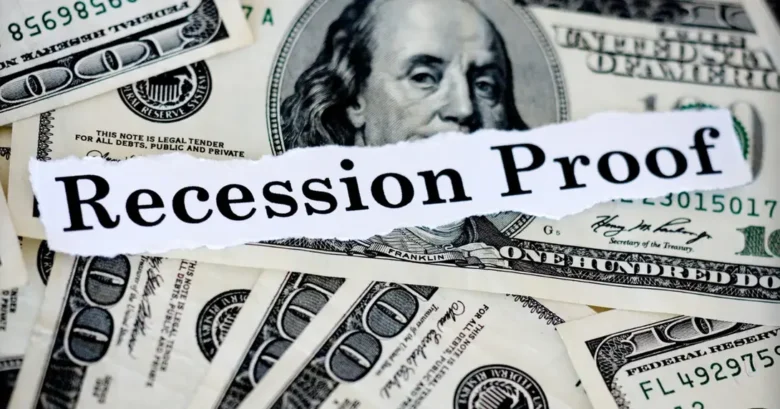While financial instability is inevitable, recessions are not. With factors like rising inflation, an unstable job market, and the volatility of global events, preparing for a recession is more important than ever. Despite your lack of financial expertise, you can effectively navigate financial challenges by implementing smart strategies such as debt reduction, income diversification, and emergency fund building. To help you stay safe, regardless of the economic situation, this guide breaks down practical strategies to protect yourself from a recession. Let’s talk about how you can take control now and create a more secure future.
Build a Solid Emergency Fund:
The first line of defense against monetary instability is an emergency fund. While experts recommend saving at least three to six months’ worth of living expenses, it’s safer to aim for a full year’s worth of savings. To boost your savings, you can set aside a small portion of each paycheck, cut unnecessary expenses, or sell unnecessary items. Money market funds or high-yield savings accounts are the best places to keep this money, given their liquidity and moderate growth potential. Without an emergency fund, unexpected medical expenses or job loss can push you into debt, making it even harder to survive a recession.
Reduce Debt and Avoid High-Interest Loans:
During a recession, it’s easy to become overwhelmed by debt, especially credit cards or high-interest personal loans. Focus on actively paying down existing debt using the avalanche method, starting with the highest-interest debt. Consider negotiating a lower interest rate with your lender or consolidating your loans. To avoid payment shock, avoid taking on new debt unless necessary; if you do need to borrow, opt for a fixed-rate loan. Less debt gives you more financial flexibility during an economic downturn.
Diversify Your Income Sources:
During a recession, it’s dangerous to rely solely on one source of income. Diversifying your income through investments, part-time jobs, freelance work, or rental income can create a financial safety net. Consider your earning potential, such as through digital content creation, coaching, or consulting. Peer-to-peer lending and dividend-paying stocks are examples of passive income sources that can also generate steady cash flow. During economic stability, having multiple income streams can prevent job losses and accelerate wealth accumulation.
Invest Wisely for Long-Term Stability:
Market volatility is common during a recession, but panic selling can lead to losses. Instead, focus on long-term investments in reliable assets, such as real estate, blue-chip stocks, or index funds. Dollar-cost averaging (regularly investing a fixed amount) can reduce risk by smoothing out price fluctuations. Avoid speculative investments and prioritize a diversified portfolio that matches your risk tolerance. Historically, markets have recovered over time, so preserving and growing wealth requires consistent investment.
Reduce Unnecessary Expenses and Live Frugally:
Cutting discretionary spending can free up money for debt reduction and savings. Review your luxury purchases, dining out, and subscriptions; get rid of anything you don’t really need. Meal planning, buying secondhand, and taking public transportation are all ways to save money. Accumulating small savings provides a safety net for necessities during tough economic times. Living within your means now will prepare you, even if your salary drops later.
Improve Your Skills and Job Security:
Job stability is crucial during a recession. Strengthening your skills in in-demand sectors like project management, programming, or digital marketing increases your employability. Network actively, maintain a strong LinkedIn profile, and look for qualifications that will strengthen your resume. If layoffs are likely, consider retraining within your organization or transitioning to recession-resistant sectors like utilities, healthcare, or essential services.
Protect Your Credit Score:
A high credit score ensures you can get a loan or favorable terms when needed. Keep your credit card balances low, avoid closing old accounts (which shortens your credit history), and pay your bills on time. Please review your credit report for any errors and promptly address any discrepancies. In financial difficulties, a favorable credit history is crucial for obtaining a low-interest loan or refinancing your mortgage.
Review Insurance Coverage for Adequate Protection:
Insurance can shield you from unforeseen expenses that could disrupt your budget. Make sure your disability, homeowners, auto, and health insurance are adequate and up-to-date. If you have dependents, consider getting term life insurance. Emergencies are inherently stressful; the right coverage can prevent you from going bankrupt due to financial loss or medical expenses.
Stay Informed and Adapt to Economic Changes:
Being well-informed allows you to proactively adjust your strategies in a rapidly changing economy. Subscribe to economic newsletters to stay informed about reliable financial news and seek advice from financial experts when needed. Maintaining flexibility—whether it’s changing jobs, exploring opportunities, or adjusting your spending plans—is crucial to maintaining financial stability.
Conclusion:
The goal of recession-proofing is to build financial resilience, not fear. You can build a foundation that can withstand economic volatility by increasing your savings, reducing debt, diversifying your income streams, and making smart choices. Start small, maintain consistency, and prioritize long-term security over immediate happiness. While building financial resilience takes time, everything you do now will bring you closer to a solid foundation. You’ll be prepared to face whatever comes next with confidence.
FAQs:
1. What is the ideal size for my emergency fund?
For ultimate protection during unpredictable times, aim for three to six months of living expenses, or up to a year.
2. Which side hustles are most profitable during a recession?
Flexible options include freelance work, teaching, gig economy jobs (such as DoorDash and Uber), and internet businesses (such as blogging and e-commerce).
3. Should I stop investing if a recession hits?
No, stay invested for the long term and diversify your portfolio. For patient investors, market downturns often offer buying opportunities.
4. How can I improve my credit score as quickly as possible?
Make sure all bills are paid on time, pay off large credit card debts, and avoid applying for new lines of credit.
5. Which sectors are most recession-resistant?
Healthcare, utilities, education, and essential retail (pharmacies and grocery stores) typically remain strong during a recession.




